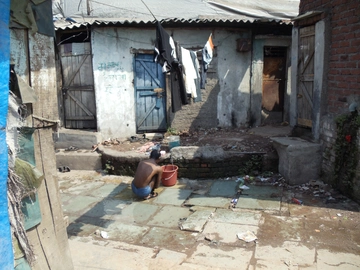WATSAN: What's on? ZEF's research on the nexus of water, sanitation, and agriculture
April 25, 2014.
The goals of research within the so-called WATSAN project are to identify trade-offs, synergies, and thresholds in the nexus of water quality and quantity, sanitation and hygiene, as well as agriculture. The project also investigates implications for investment priorities and better health and nutrition outcome. Furthermore, it aims to strengthen the capacity of households and communities to monitor and manage their own environment with regard to water, agriculture and health. The project will be carried out in Ethiopia, Ghana, India, and Bangladesh. These countries have been selected on the basis of features relevant to this research: drinking water, sanitation services, and hygiene conditions are seriously deficient, and health and nutrition situations particularly adverse.
Background and relevance
There is a strong correlation between water, sanitation, hygiene, and nutrition. Poor environmental health as well as poor water and sanitation are notoriously known as the key cause of diarrhea, tropical enteropathy, and intestinal worms. Diarrhea is the second leading cause of death among children under-five. Intestinal worms infect around 2 billon people across the globe and around 4.5 billion people are at risk. The WHO/UNICEF Joint Monitoring Program for Water and Sanitation 2013 reports that in 2011, 768 million people lacked access to improved drinking water, while the sanitation coverage in 2011 was 64%, far below the MDG sanitation target of 75%. The report further documents that 15% of the global population practiced open defecation. Water and sanitation challenges include the populations who have no access to drinking water and basic sanitation – a situation exacerbated by population growth, rapid urbanization and climate change.
Research objectives
The researchers explore how to invest in water, sanitation, and hygiene in the most effective way. A review of the impact of the “WASH” (Water, sanitation and hygiene) intervention undertaken by the International Initiative for Impact Evaluation documents that hygiene practices involving hand-washing with soap and the usage of toilets reduce diarrhea prevalence by 37% and 34%, respectively. Improved water quantity and quality and improved sanitation and hygiene enhance health and nutrition outcome. However, these areas overlap with irrigation agriculture which has an additional impact on health and nutrition outcome and influences health in various ways: Water harvesting techniques, irrigation canals, ponds, tanks and/or dams are among the contributing factors that impair human health. Irrigation water can create suitable conditions for the propagations of water and vector-borne diseases such as malaria.
Research approaches
It is crucial to take an integrated perspective from different scientific disciplines when addressing the issues of water and sanitation and their links to other sectors, particularly agriculture. The WATSAN project will therefore involve scientists from a broad range of relevant disciplines (ecology, hydrology, agronomy, economy, sociology, and public health). The project compiles panel household data from various sources such as the Demographic and Health Surveys and other national surveys. These data will be combined with original data collections in the communities.
Project partners include the Ethiopian Economic Association (EEA), Ethiopia; Institute of Statistical, Social and Economic Research (ISSER), Ghana; Public Health Foundation of India (PHFI) through Indian Institute of Public Health Gandhinagar (IIPHG), India; and BRAC in Bangladesh.
The project is funded by the Bill and Melinda Gates Foundation.
Author: <link mail window for sending>Evita Pangaribowo
You can also read this article in <link fileadmin webfiles downloads zefnews zef_news_28_en.pdf download file>ZEF news no. 28 (page 4) or find more information on the <link http: www.zef.de external-link-new-window external link in new>WATSAN website.



